
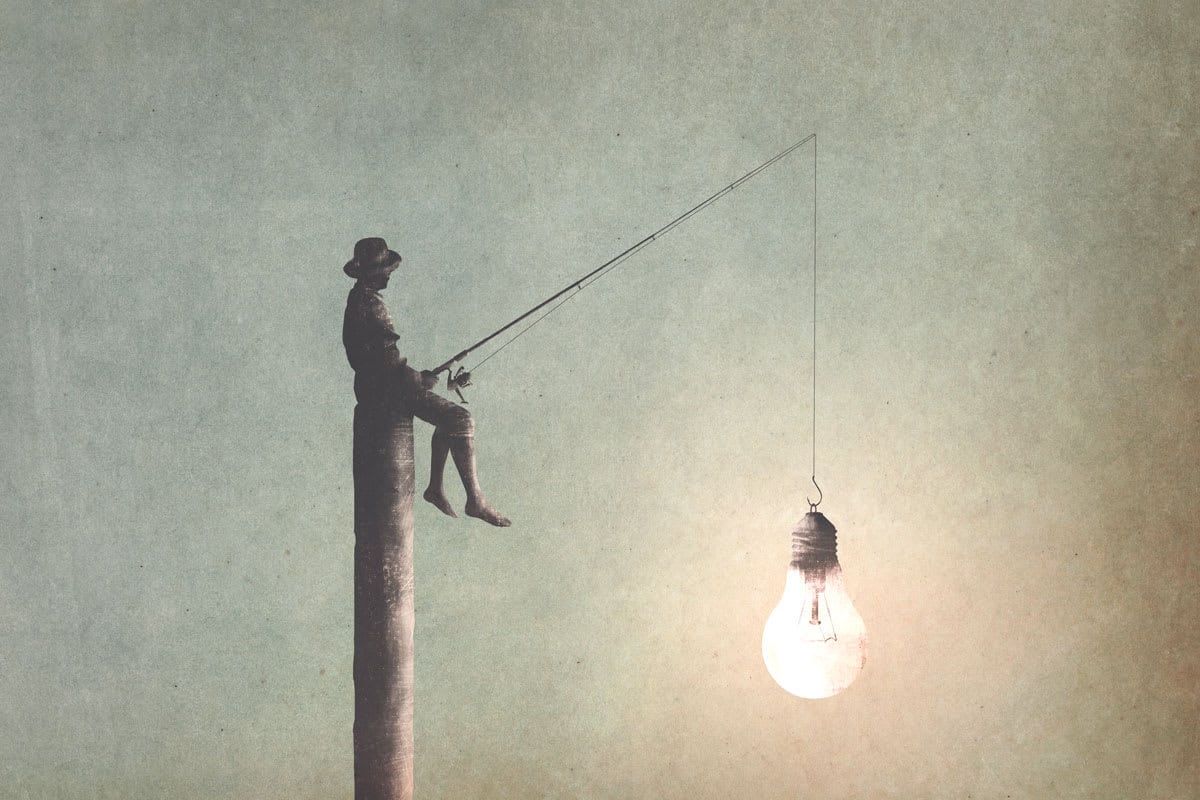
30 Questions for a Narrative Believer
by Margaret Anna Alice | Nov 21, 2022
Do you (or did you) believe the COVID narrative? If so, would you be willing to answer some questions?
All I ask is that you honestly engage with the questions. I promise to listen attentively and respectfully.
Your responses may help me and many others answer questions of historic importance.
If you would like me to consider publishing your answers in a future post, please share them in the comments. If you would prefer to keep them anonymous, you can email them to me by signing up for my newsletter and replying to the Welcome message. Feel free to selectively respond if you don’t have time to answer them all.
Thank you for sharing your time and thoughts.
Note to My Readers
I need your help gathering responses. Can you please share this widely and ask friends, family members, coworkers, and other narrative believers to take this opportunity to relay their perspective?
With the holidays coming up, this could offer a meaningful way to connect and help you understand each others’ experiences and viewpoints. You could record audio or video of their responses as you ask them and then send me transcripts of their answers if they are willing to share them publicly (I can retain anonymity as desired).
I realize there are a lot of time-consuming questions here, and you may try the patience of your subjects if you try to go through all of them. The first question alone could prompt an hourlong conversation. To save time, you may wish to select the ones you think are most appropriate for the particular party.
If you’re part of a church or other group, you could see if it would be possible to set up discussion groups, and people could take turns answering questions, maybe over multiple sessions.
Get creative! Feel free to add your own questions (share in the comments if you’d like) and simply use this article as a springboard for deeper conversations.
While asking questions, try to avoid being confrontational or judgmental. We want participants to reflect on their feelings, thoughts, experiences, and behavior without fear of backlash. This may open up avenues for healing dialogue as you process the past three years together.
For inspiration, see the story Marion shares about the “clearing” exercise she participated in during a recent retreat.
30 Questions
1) What is your overall perception of what has occurred since COVID entered the scene nearly three years ago, and how has your thinking evolved on the following topics over time (if it has)?
a) lockdowns
b) social distancing
c) masking
d) school closures
e) COVID vaccines
f) mandates
g) vaccine passports
h) natural immunity
i) early treatment protocols
j) free speech vs. censorship
k) individual rights vs. social responsibility
l) the role of governments, agencies, and influential figures in public health policy
2) How did you arrive at those views? Did you find you felt one way about a topic initially and then it changed—and if so, how did it change and why?
3) Were you in agreement with most of the people around you, or did some of your friends or family members see things differently? How did you work through those differences, if any?
4) Do you tend to consume a range of media representing diverse viewpoints, or do you pretty much stick to a few trusted sources? If the latter, what do you consider reliable sources of news and information?

Made by JimBob: Siri Customizing the Narrative
5) Which of these media do you consume, if any (please share the specific outlets you turn to most often):
a) television
b) newspapers
c) magazines
d) radio
e) mainstream news websites
f) social media
g) newsletters
6) Which search engine(s) do you use? Do you trust sources like Wikipedia and sites that present themselves as fact-checkers (e.g., Snopes)?
7) If you had heard the views of the many scientists, physicians, and other qualified experts presenting data, research, expertise, and informed opinions that contradicted the narrative being promoted by mainstream media, would you have thought twice before accepting what the pundits were saying?
8) Did the use of namecalling (e.g., “anti-vaxxer,” “conspiracy theorist,” “right-wing extremist,” “misinformation spreader”) cause you to automatically dismiss and avoid evaluating certain sources for yourself?
9) How many COVID shots have you had? How many are you willing to get—and how often? Do you think once you and your loved ones received the injection, you experienced a “buy-in” effect and could no longer evaluate the risks objectively?
10) Does it concern you that vaccine manufacturers have zero liability should recipients experience any potentially debilitating or even lethal side effects? This is thanks to emergency use authorizations, and, once those expire, the 1986 National Childhood Vaccine Act, which shields pharmaceutical corporations from responsibility for damages if the product is added to the childhood schedule of vaccinations.
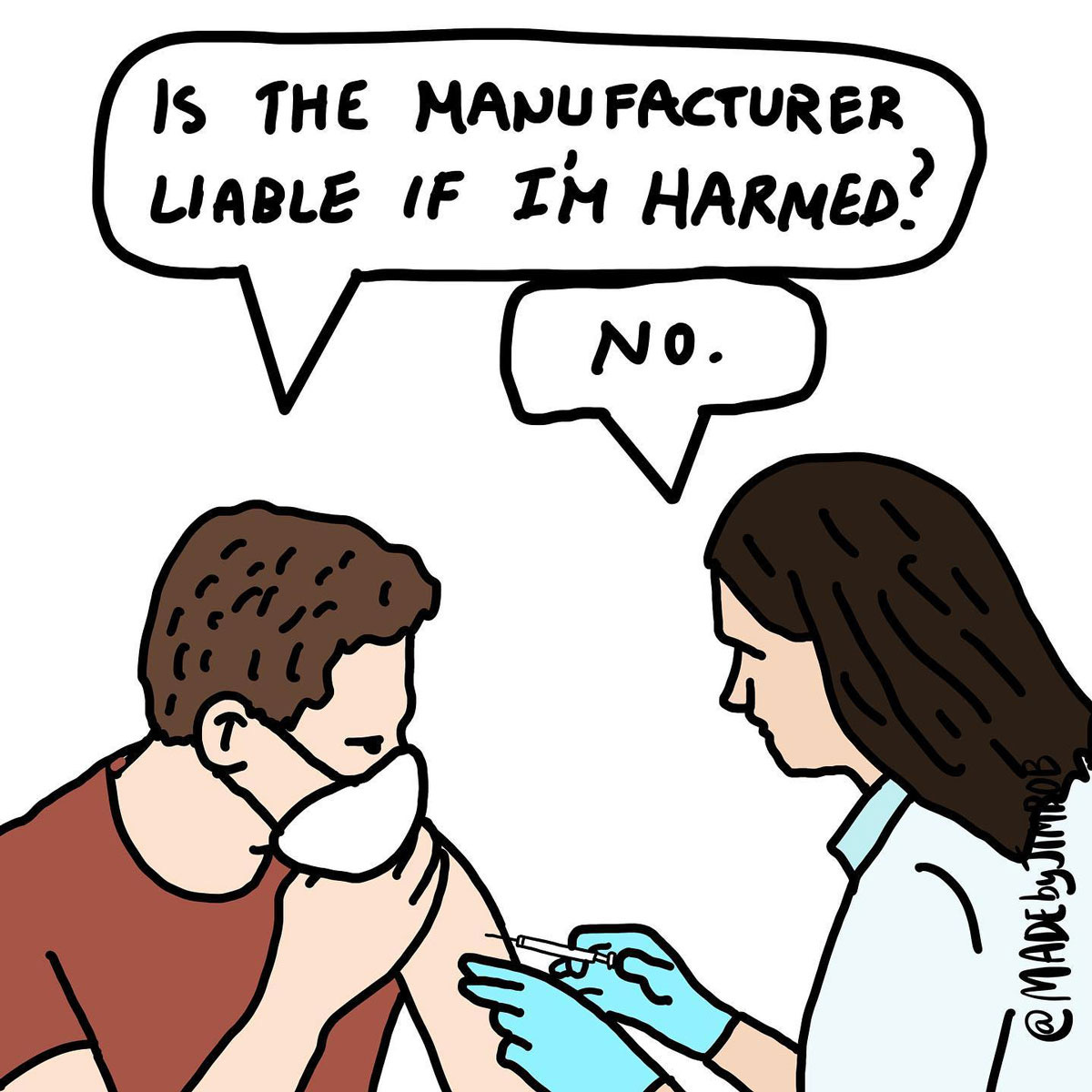
Made by JimBob: Is the Manufacturer Liable?
11) Did you research the vaccines, masking, and other COVID protocols, or were you too busy attending to your daily life and work responsibilities? Did you feel overwhelmed by competing information and decide you had no choice but to trust certain experts to help make important decisions for you?
12) If you did research, how many hours did you spend researching the mRNA injections, for example, and what form did that take? How does that compare to the amount of time you spent researching a home, car, or other major purchasing decision? Did you perform a cost-benefit analysis?
13) Think back to early 2020 just after the pandemic was declared and the first lockdown was instituted. How did you feel? Were you fearful? Did you think the extreme measures were an overreaction? Do you remember anything like that ever happening before? Did the measures make sense to you in light of historical responses to similar threats?
14) If you have children, what has this experience been like for them? How did they react to masking, social distancing, lockdowns, school closures, and vaccination? How were they affected on psychological, emotional, and physical levels?
15) Do you know anyone personally whose death was attributed to COVID? Would you have felt less afraid of catching COVID if you had learned the death tallies and case counts were intentionally exaggerated through mechanisms such as:
a) counting deaths with, not just from, COVID (e.g., people who died from comorbidities, old age, and other causes such as car accidents but who tested positive for COVID);
b) running the PCR tests at such a high cycle rate they yielded numerous false positives;
c) financially incentivized administration of protocols known to cause death such as remdesivir, ventilation/intubation, and midazolam; and
d) the smearing and suppression of early treatment protocols now understood to achieve up to a 92-percent reduction in COVID mortality rates?
16) How did you feel when you learned the COVID vaccines do not prevent or even reduce transmission—that indeed they have negative efficacy, which means they increase people’s chances of contracting COVID, being hospitalized, and dying?
17) At any point as the goal posts shifted (e.g., the injection prevents transmission; okay, there are breakthrough infections, but it reduces hospitalization; okay, there are hospitalizations, but you’re not as likely to die; and so on until the CDC finally conceded defeat by applying the same guidelines to the uninjected as the injected), did you ever feel like your gut was telling you something was wrong with what the media/government/Big Tech was telling you, but you brushed those suspicions aside for whatever reason?
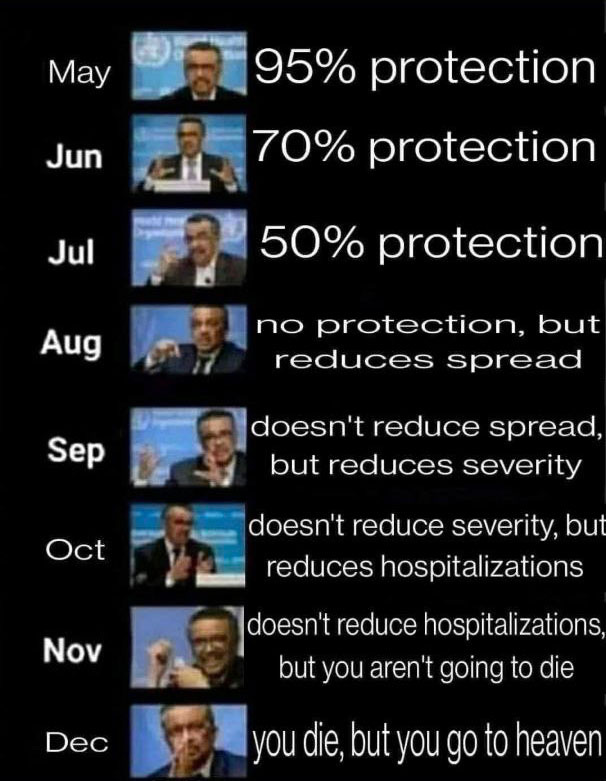
18) How do you feel about the Pfizer executive’s recent admission to the European Parliament that their product was never tested to see if it prevented transmission, even though that was the pretense used to justify mandates and vaxxports?
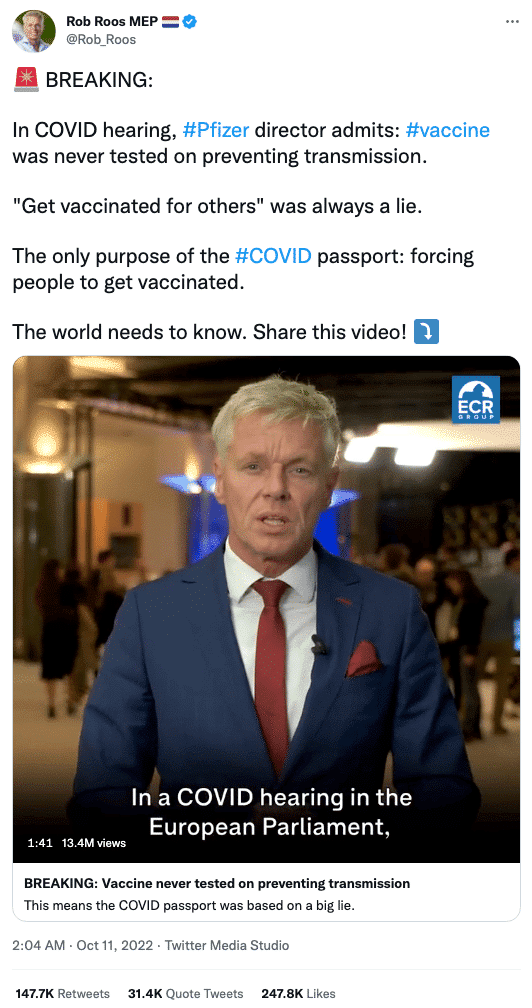
Or what about the statement by Pfizer’s recently retired Head of Vaccine R&D Kathrin Jansen published in a November 11, 2022, Nature article:
“We got creative—we couldn’t wait for data, we had to do so much ‘at risk’. We flew the aeroplane while we were still building it.”
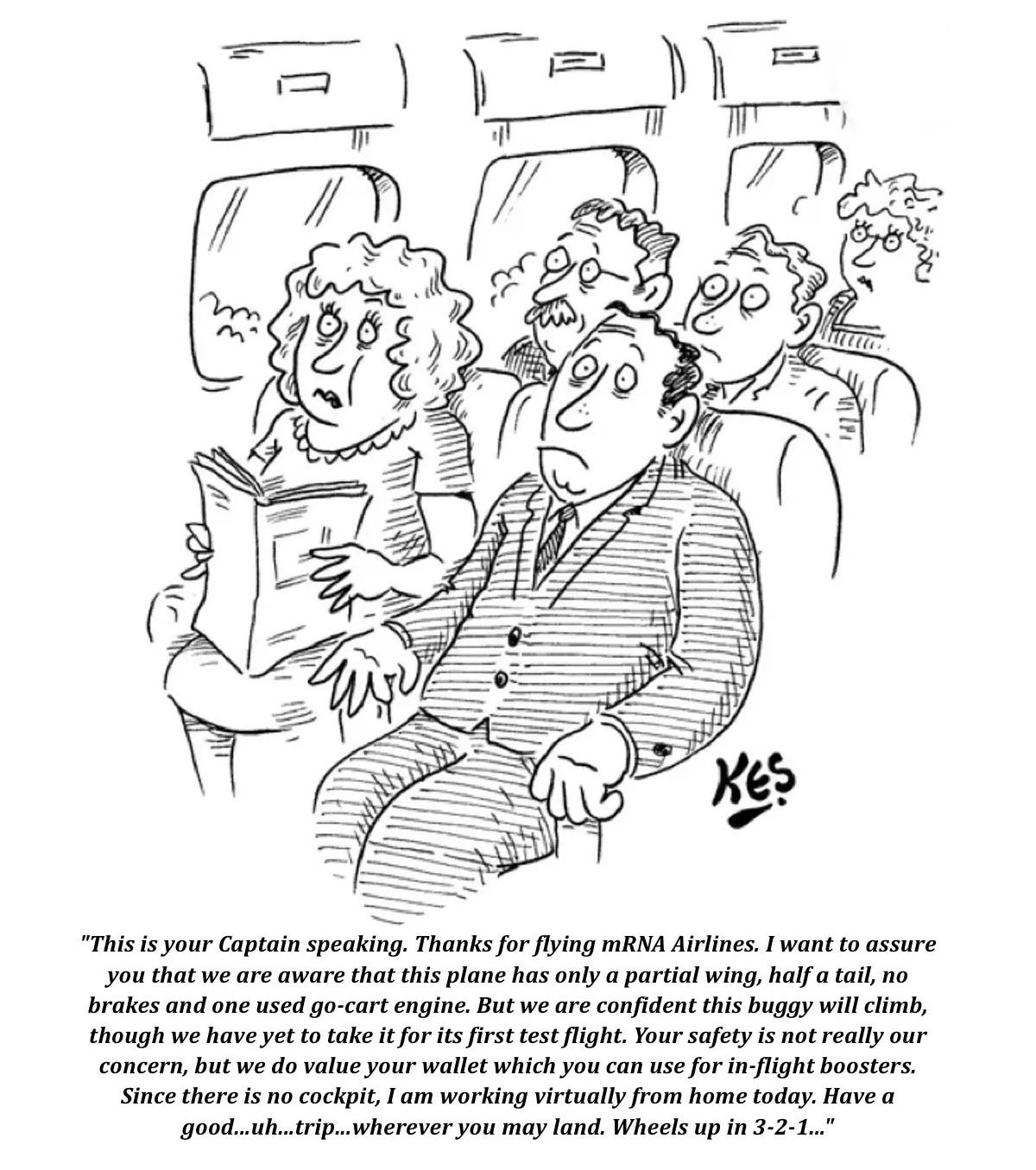
19) In July 2020, Yale University conducted a study to determine which emotional manipulation messaging approaches would be the most effective at persuading people to get the COVID injection. The baseline message focused on the “effectiveness and safety of vaccines.” Does it bother you that they were using the “safe and effective” verbiage before these products had even been developed and tested for safety and efficacy—making it clear this was about managing public perception and behavior instead of being backed up by scientific evidence?
Below are the other messages Yale tested (verbatim from the study, including errors). Which ones resonated with you? How do you feel about being subjected to campaigns intended to change your beliefs and behavior? Would you have been susceptible to these messages if you’d known they were formulated specifically to nudge you into compliance by weaponizing your emotions against you?
Experimental: Personal Freedom
Other: Personal Freedom Message
1/15 of the sample will be assigned to this intervention, which is a message about how COVID-19 is limiting people’s personal freedom and by working together to get enough people vaccinated society can preserve its personal freedom.
Experimental: Economic Freedom
Other: Economic Freedom Message
1/15 of the sample will be assigned to this intervention, which is a message about how COVID-19 is limiting peoples’s economic freedom and by working together to get enough people vaccinated society can preserve its economic freedom.
Experimental: Social Benefit, Self-Interest
Other: Self-Interest Message
1/15 of the sample will be assigned to this intervention, which is a message that COVID-19 presents a real danger to one’s health, even if one is young and healthy. Getting vaccinated against COVID-19 is the best way to prevent oneself from getting sick.
Experimental: Social Benefit, Community Interest
Other: Community Interest Message
1/15 of the sample will be assigned to this intervention, which is a message about the dangers of COVID-19 to the health of loved ones. The more people who get vaccinated against COVID-19, the lower the risk that one’s loved ones will get sick. Society must work together and all get vaccinated.
Experimental: Economic Benefit
Other: Economic Benefit Message
1/15 of the sample will be assigned to this group, which is a message about how COVID-19 is wreaking havoc on the economy and the only way to strengthen the economy is to work together to get enough people vaccinated.
Experimental: Social Pressure – Guilt
Other: Guilt Message
1/15 of the sample will be assigned to this message. The message is about the danger that COVID-19 presents to the health of one’s family and community. The best way to protect them is by getting vaccinated and society must work together to get enough people vaccinated. Then it asks the participant to imagine the guilt they will feel if they don’t get vaccinated and spread the disease.
Experimental: Social Pressure – Embarrassment
Other: Embarrassment Message
1/15 of the sample will be assigned to this message. The message is about the danger that COVID-19 presents to the health of one’s family and community. The best way to protect them is by getting vaccinated and by working together to make sure that enough people get vaccinated. Then it asks the participant to imagine the embarrassment they will feel if they don’t get vaccinated and spread the disease.
Experimental: Trust in Science
Other: Trust in Science Message
1/15 of the sample will be assigned to this message about how getting vaccinated against COVID-19 is the most effective way of protecting one’s community. Vaccination is backed by science. If one doesn’t get vaccinated that means that one doesn’t understand how infections are spread or who ignores science.
Experimental: Not Bravery Arm
Other: Not Bravery Message
1/15 of the sample will be assigned to this message which describes how firefighters, doctors, and front line medical workers are brave. Those who choose not to get vaccinated against COVID-19 are not brave.
20) Did you know three quarters of the media’s advertising budget comes from pharmaceutical companies; the US government funneled a billion dollars to the media to propagate the COVID narrative and paid screenwriters and comedians to mock the unvaccinated; and the UK government paid social media influencers to spread their messaging and employed behavioral psychologists at the Behavioural Insights Team (BIT, known as the “Nudge Unit”) to craft fear campaigns intended to influence public opinion and behavior? Does knowing that make you question your trust in the media, spokespersons, and influencers?
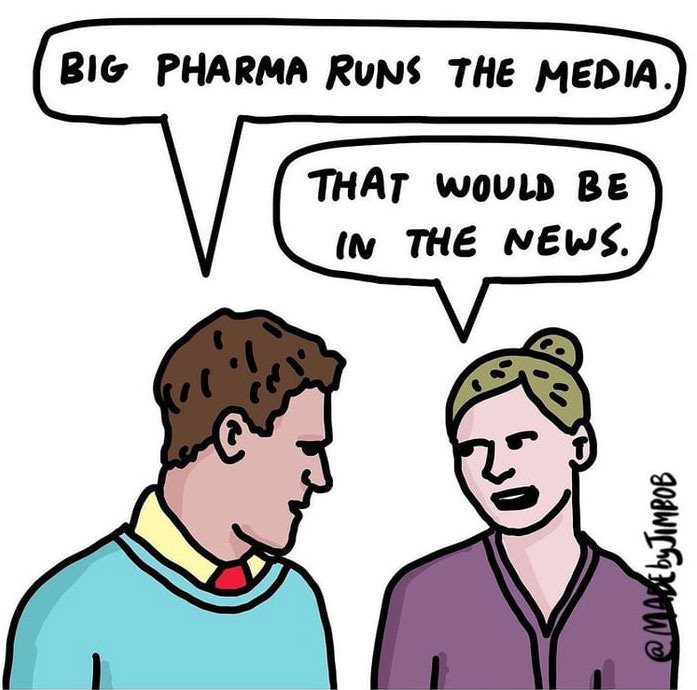
Made by JimBob: Big Pharma Runs the Media
21) Are you aware that the CDC changed its definition of “vaccine” from “a product that stimulates a person’s immune system to produce immunity to a specific disease, protecting the person from that disease” to “a preparation that is used to stimulate the body’s immune response against diseases”? Do Orwellian redefinitions of “vaccine” as well as “pandemic,” “herd immunity,” “fully vaccinated,” “cause of death,” and “case” give you pause?
22) Bayer executive Stefan Oelrich said the following about the mRNA technology:
“If we had surveyed two years ago if people were willing to take gene or cell therapy and inject it into your body, we would have probably had a 95-percent refusal rate.”
If the COVID product had been framed as “gene or cell therapy” instead of being called a “vaccine,” would you have hesitated and done more research before accepting it?
23) Did you know the FDA tried to hide the Pfizer clinical trial data from the public for seventy-five years—and when they were required by a court order to start releasing that data, it was discovered the Cumulative Analysis of Post-Authorization Adverse Event Reports for the first ninety days documented 1,223 deaths, 158,000 adverse events, and 1,291 side effects following injection? Does that make you wonder whether the FDA is more concerned about protecting Pfizer than you and your loved ones?
24) Do you think it’s okay to censor people and threaten to strip the licenses of doctors who question the narrative like AB2098, the law recently passed in California, does?
25) Are you aware that the CDC has received 1,463,068 reports of adverse events for the COVID vaccines through November 11, 2022, including 32,220 deaths (26 percent of which occurred within the first three days after injection)?
26) Have you or has anyone you know experienced new health issues since being injected, whether diagnosed or undiagnosed? Do you know any vaccinated individuals who have suddenly died or developed a life-threatening illness like cancer? Please share details.
27) Do you know about the pharmaceutical industry’s long history of corruption, fraud, and negligent homicide and that the FDA, for example, was found responsible for causing approximately 60,000 deaths by helping Merck cover up the dangers of Vioxx? Similarly, did you know “Israel found serious safety problems with the COVID vaccines then deliberately covered it up”?
28) Do you know what regulatory capture is? It basically means the agencies (e.g., the FDA, CDC, and NIH) responsible for ensuring the safety and efficacy of pharmaceutical products benefit financially from their approval and distribution. Do you feel confident their decisions regarding COVID products were untainted by conflicts of interest?
29) Do you believe you were given informed consent about the risks to you and your loved ones, particularly infants and children? Would you have gotten vaccinated if you’d understood it does not prevent you from getting or spreading COVID, being hospitalized, or dying and that it comes with a high probability of serious side effects, including death?
30) Do you have any regrets about your beliefs, decisions, and behavior over the past three years? If you have regrets, what would you change, and how will you avoid repeating those mistakes in the future?
Bonus Question #1: For extra credit, answer these twenty Yes/No questions.
Bonus Question #2: Are you ready to inoculate yourself against future propagandizing and public opinion engineering by undergoing this simple twelve-step recovery program?
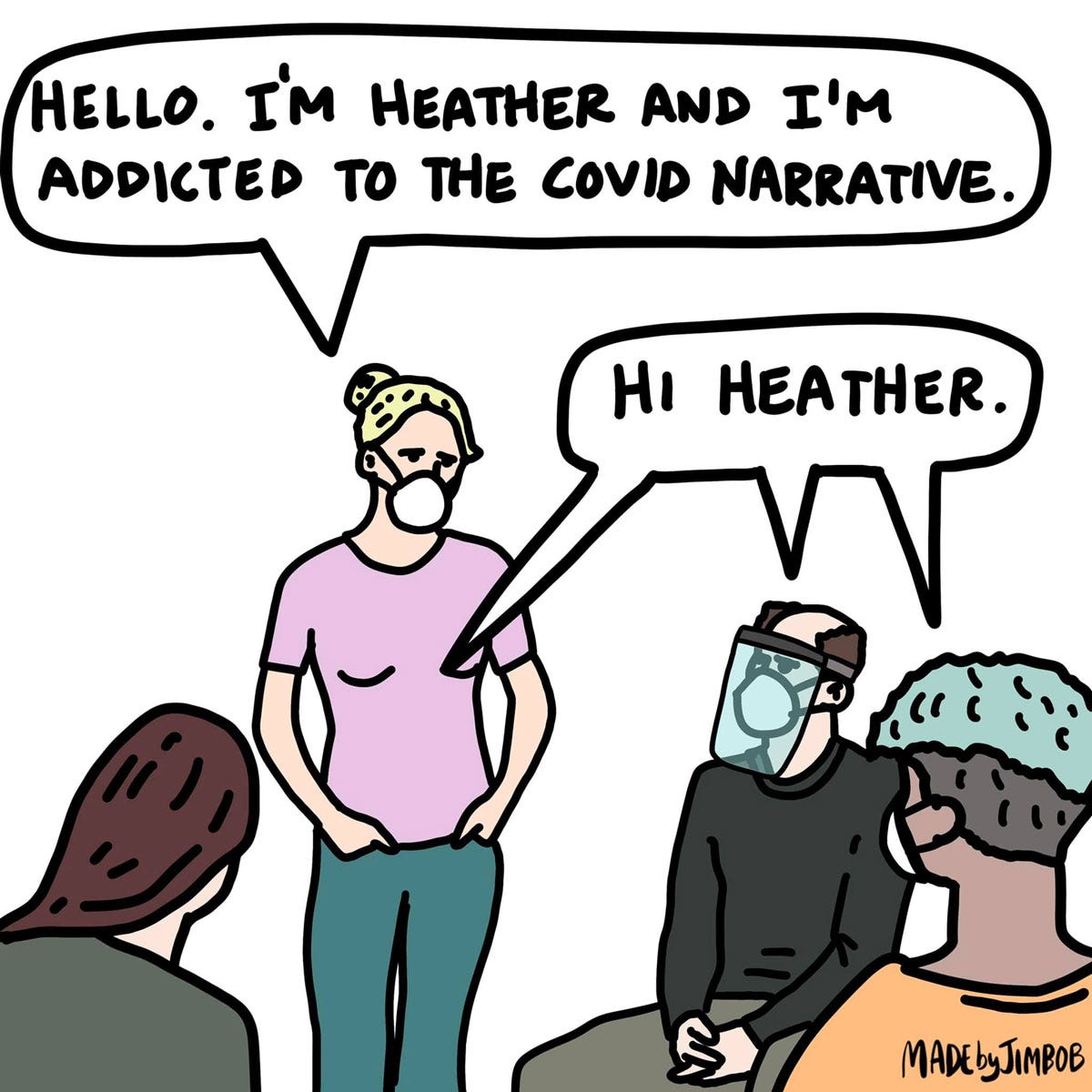
Made by JimBob: Addicted to the COVID Narrative


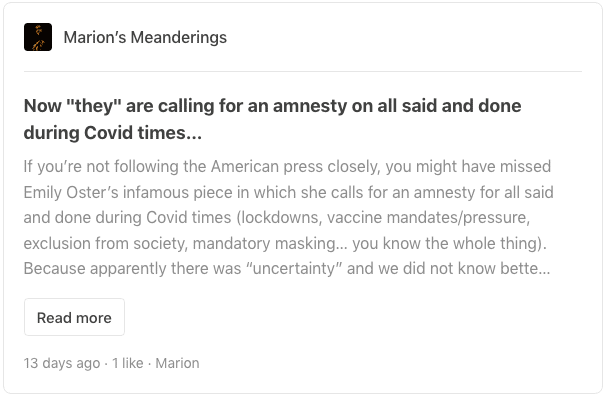
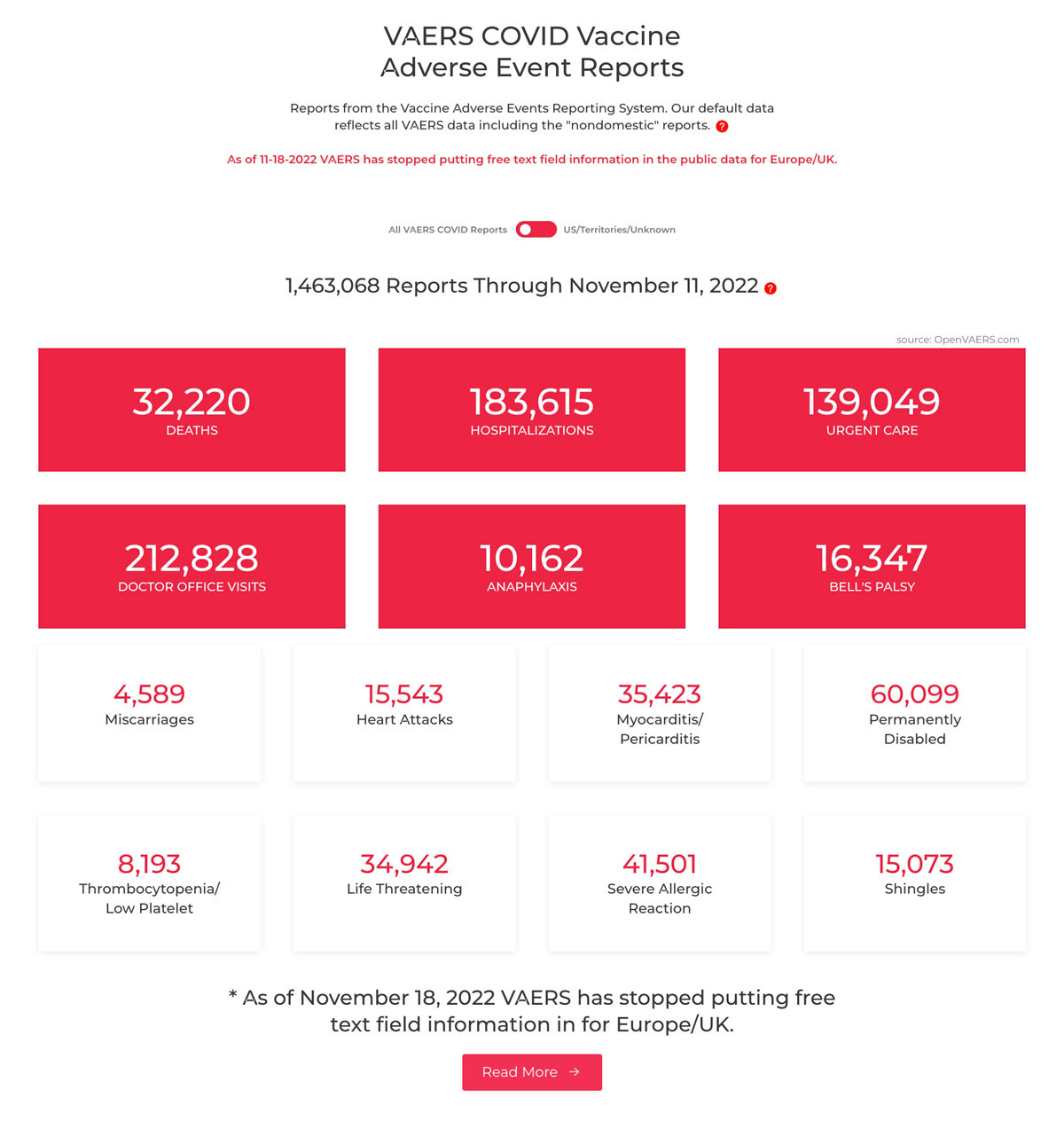
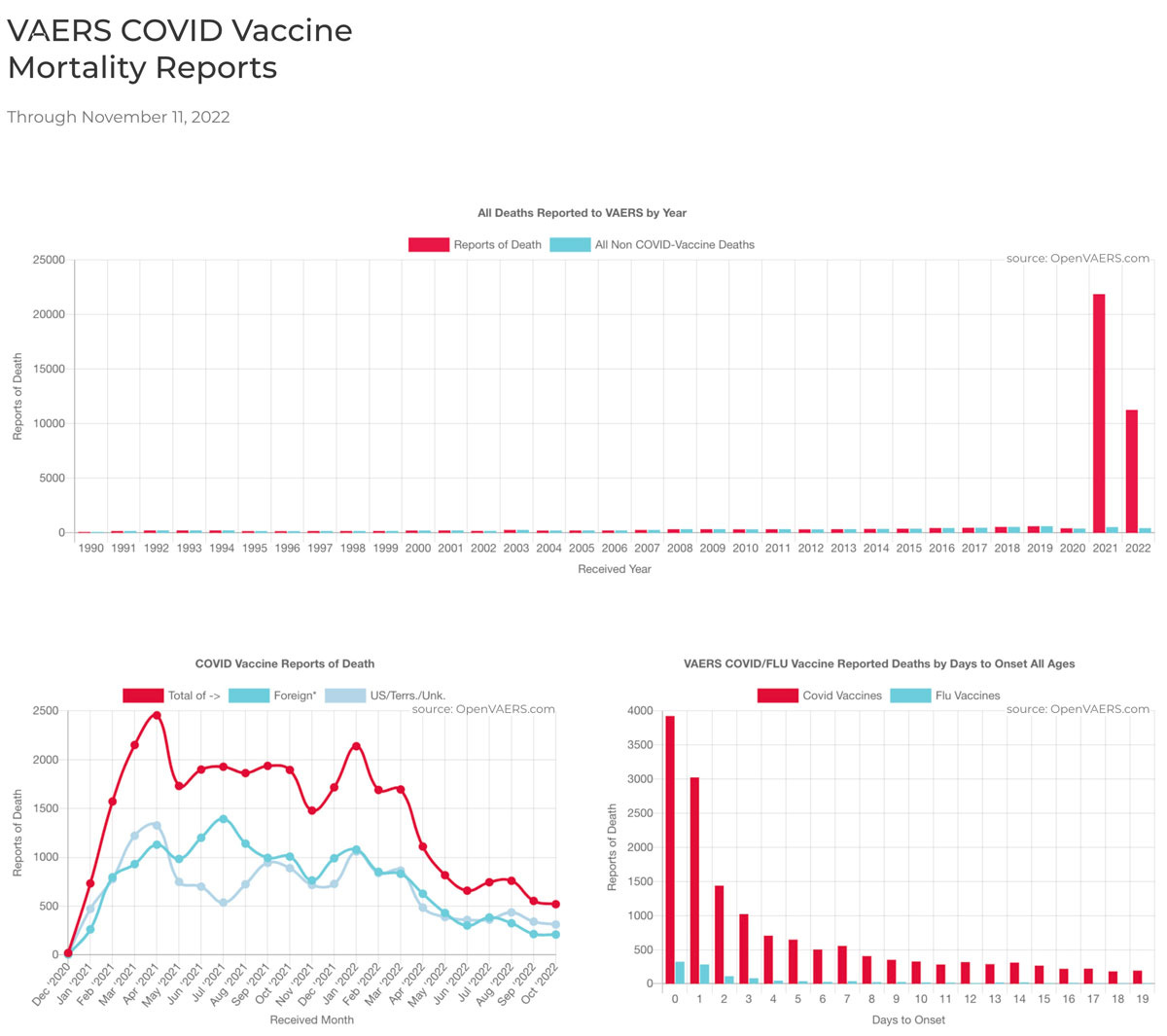
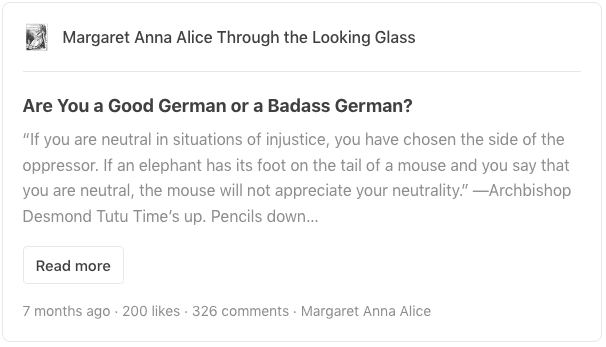
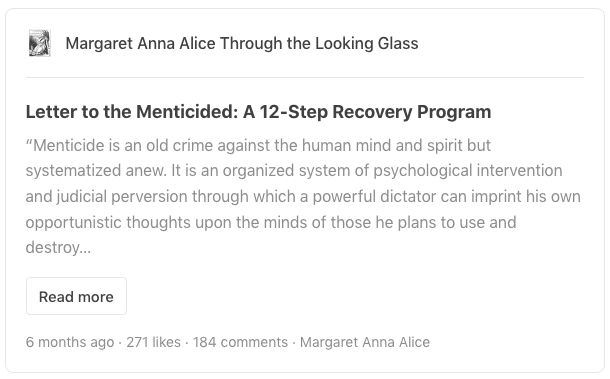
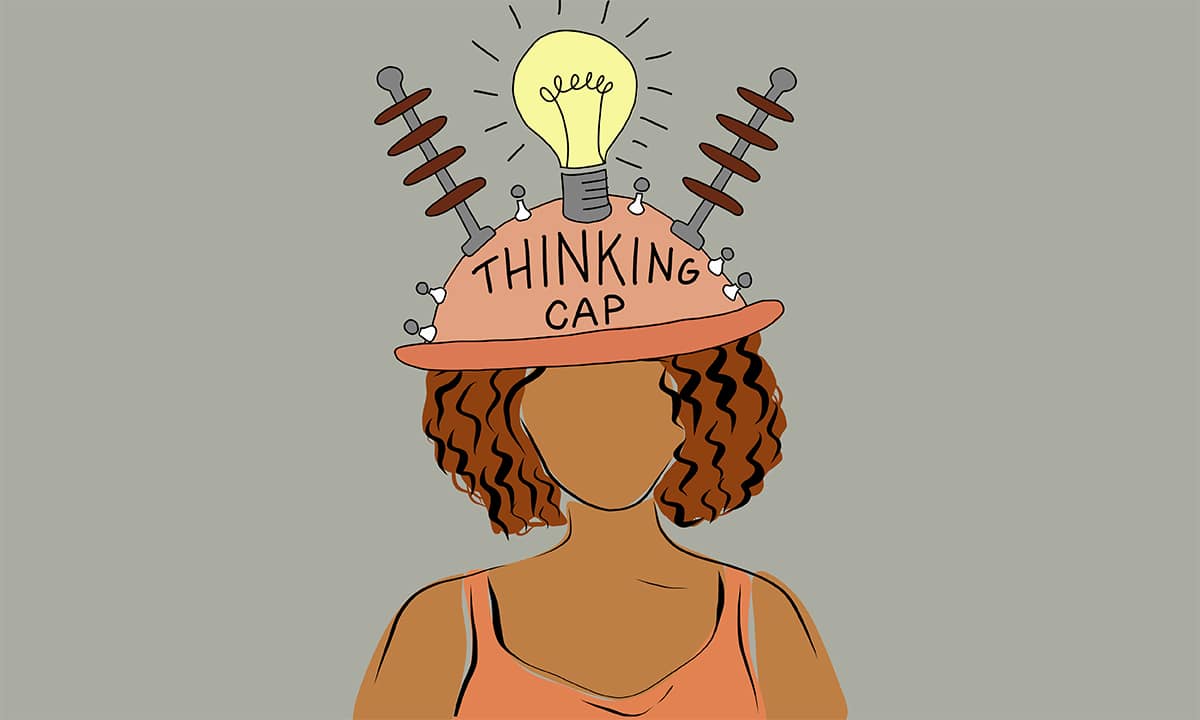
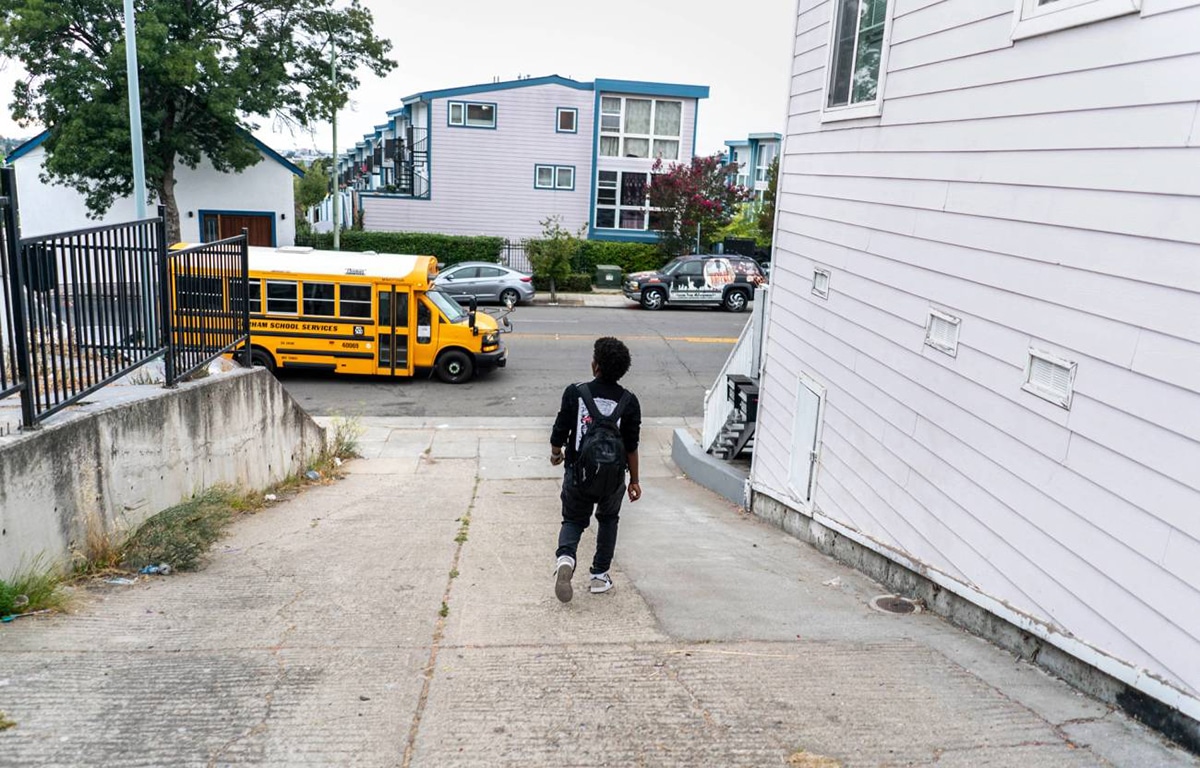

0 Comments